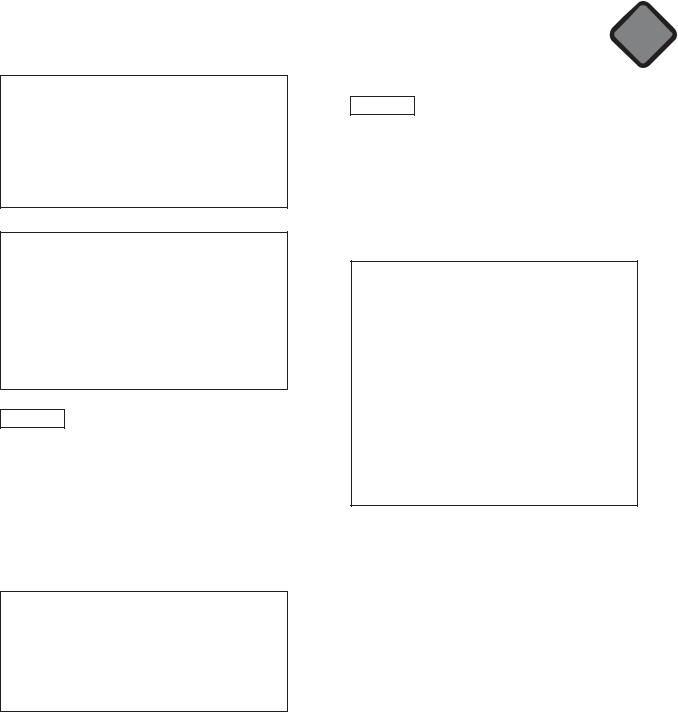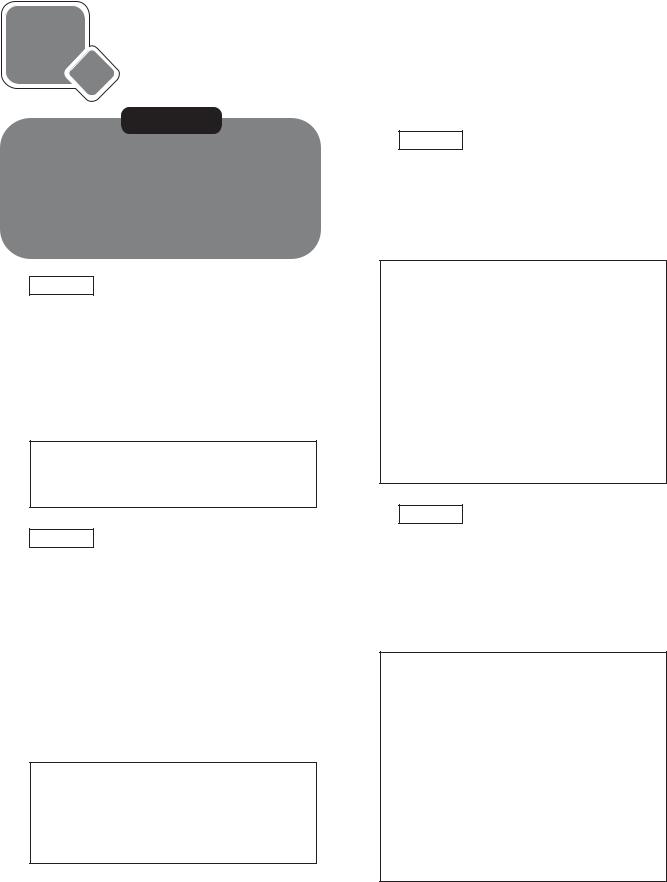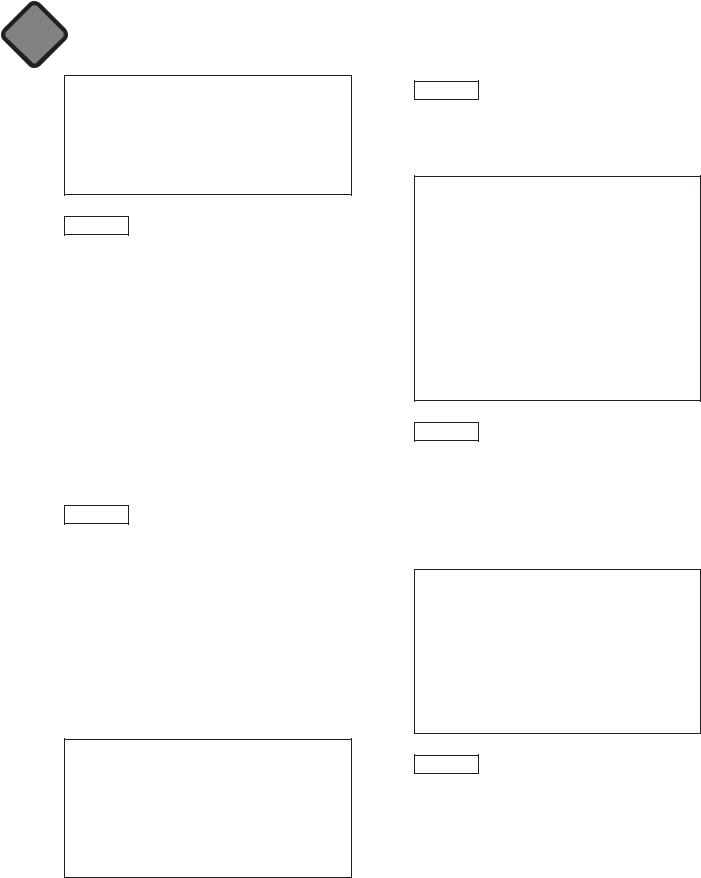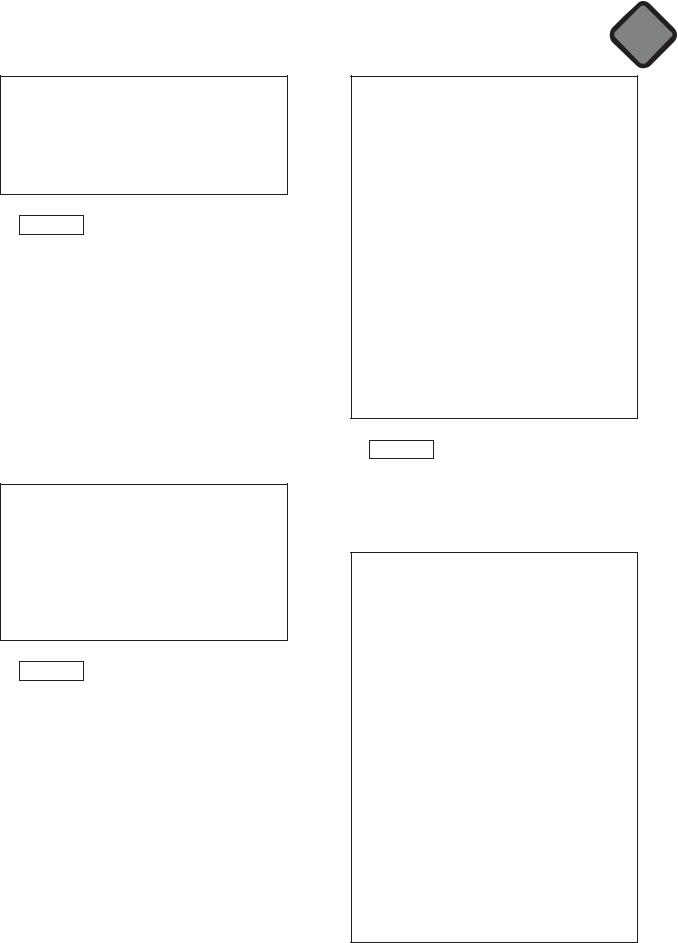
Spotlight-11Teachers-Book Workbook Keys / Spotlight-11 Teachers-Book
.pdf
4c |
|
|
Grammar in Use |
|
|
|
|
|
|
|
|
|
|
|
|
|
|
|
|
|
|
|
|
|
|||
|
|
|
|
|
|
|
|
|
|
ñ Explain the task. Ss answer individually. |
|
|
|||||||||||||||
|
|
|
|
|
|
|
|
|
|
|
|
||||||||||||||||
3 |
|
Focus |
Forming sentences using the passive |
|
|
||||||||||||||||||||||
|
ñ Ss compare answers with a partner. |
|
|
|
|||||||||||||||||||||||
|
ñ Explain the task. |
|
|
|
|
|
|
|
|||||||||||||||||||
|
|
|
|
|
|
|
|
|
|
|
|
|
|
|
|
|
|
|
|
|
|
|
|||||
|
ñ Ss answer individually. |
|
|
|
|
|
Answer Key |
|
|
|
|
|
|
|
|
|
|
|
|||||||||
|
ñ Check Ss’ answers around the class. |
|
|
|
personal passive construction: subject + |
|
|||||||||||||||||||||
|
|
|
|
|
|
|
|
|
|
|
|
||||||||||||||||
|
|
|
|
|
|
|
|
|
|
|
passive verb + to infinitive (e.g. She is thought |
|
|||||||||||||||
|
|
|
Answer Key |
|
|
|
|
|
to be very ill) |
|
|
|
|
|
|
|
|
|
|
|
|||||||
|
|
|
2 He hates to be kept waiting. |
|
|
|
|
impersonal passive construction: it + passive |
|
||||||||||||||||||
|
|
|
3 Parking is not allowed. |
|
|
|
|
|
|||||||||||||||||||
|
|
|
|
|
|
|
verb + finite clause (e.g. It is thought that she |
|
|||||||||||||||||||
|
|
|
4 Something needs to be done immediately. |
|
|
|
|||||||||||||||||||||
|
|
|
|
|
is very ill) |
|
|
|
|
|
|
|
|
|
|
|
|||||||||||
|
|
|
5 I want to be left alone. |
|
|
|
|
|
|
|
|
|
|
|
|
|
|
|
|||||||||
|
|
|
|
|
|
|
|
|
|
|
|
|
|
|
|
|
|
|
|
|
|
|
|
||||
|
|
|
6 The Mayor has been shot. |
|
|
|
|
2 |
The |
|
doctor is |
reported |
to |
have |
made |
a |
|
||||||||||
|
|
|
7 She was not invited. |
|
|
|
|
|
|
|
|||||||||||||||||
|
|
|
|
|
|
|
|
|
mistake with the diagnosis. |
|
|
|
|
|
|
||||||||||||
|
|
|
8 No, thanks. I am being served. |
|
|
|
|
|
|
|
|
|
|
|
|||||||||||||
|
|
|
|
|
|
|
|
It |
is |
reported that |
the |
doctor |
made |
a |
|
||||||||||||
|
|
9 |
It may have been |
sent to |
the |
wrong |
|
|
|
|
|||||||||||||||||
|
|
|
|
|
mistake with the diagnosis. |
|
|
|
|
|
|
||||||||||||||||
|
|
|
|
address. |
|
|
|
|
|
|
|
|
|
|
|
|
|||||||||||
|
|
|
|
|
|
|
|
|
3 The tsunami is expected to hit at 8 am. |
|
|
||||||||||||||||
|
|
10 |
A cinema complex |
will have |
been |
built |
|
|
|
|
|||||||||||||||||
|
|
|
|
|
It is expected that the tsunami will hit at 8 |
|
|||||||||||||||||||||
|
|
|
|
(there) by next May. |
|
|
|
|
|
|
|
||||||||||||||||
|
|
|
|
|
|
|
|
|
|
am. |
|
|
|
|
|
|
|
|
|
|
|
|
|
|
|||
|
|
|
|
|
|
|
|
|
|
|
|
|
|
|
|
|
|
|
|
|
|
|
|
|
|
||
|
|
|
|
|
|
|
|
|
|
|
4 She is known to have a difficult character. |
|
|
||||||||||||||
|
|
|
|
|
|
|
|
|
|
|
|
|
|||||||||||||||
|
|
|
|
|
|
|
|
|
|
|
|
It |
is |
|
known |
that |
she |
has |
a |
difficult |
|
||||||
4 |
|
Focus |
Changing a text into the passive |
|
|
|
|
||||||||||||||||||||
|
|
|
character. |
|
|
|
|
|
|
|
|
|
|
|
|||||||||||||
|
ñ Explain the task. |
|
|
|
|
|
|
|
|
|
|
|
|
|
|
|
|
|
|||||||||
|
|
|
|
|
|
5 |
A |
monster is |
said to |
live |
in |
a |
lake |
in |
|
||||||||||||
|
ñ Ss write their answers individually. |
|
|
|
|
|
Scotland. |
|
|
|
|
|
|
|
|
|
|
|
|||||||||
|
ñ Check Ss’ answers. |
|
|
|
|
|
|
It is said that a monster lives in a like in |
|
||||||||||||||||||
|
|
|
|
|
|
|
|
|
|
|
|
Scotland. |
|
|
|
|
|
|
|
|
|
|
|
||||
|
|
|
Answer Key |
|
|
|
|
|
6 |
Andrea is |
believed to |
have |
been |
treated |
|
||||||||||||
|
|
|
An unusual way of predicting earthquakes has |
|
|
|
very badly. |
|
|
|
|
|
|
|
|
|
|
||||||||||
|
|
|
been discovered by scientists in China – snakes! |
|
|
|
It is believed that Andrea was treated very |
|
|||||||||||||||||||
|
|
|
Snakes at local snake farms are being observed |
|
|
|
badly. |
|
|
|
|
|
|
|
|
|
|
|
|||||||||
|
|
|
(by experts) to see if their behaviour changes |
|
|
7 The number of cases of asthma is thought to |
|
||||||||||||||||||||
|
|
|
before an earthquake. Cameras are linked to a |
|
|
|
be rising. |
|
|
|
|
|
|
|
|
|
|
|
|||||||||
|
|
|
broadband Internet connection (by scientists). |
|
|
|
It is thought that the number of cases of |
|
|||||||||||||||||||
|
|
|
It is believed that earthquakes from 120 km |
|
|
|
asthma is rising. |
|
|
|
|
|
|
|
|
|
|||||||||||
|
|
|
away can be sensed (by snakes), three to four |
|
|
|
|
|
|
|
|
|
|
|
|
|
|
|
|
|
|
|
|||||
|
|
|
|
|
|
|
|
|
|
|
|
|
|
|
|
|
|
|
|
|
|||||||
|
|
|
days before they happen. Their nests are |
|
|
|
|
|
|
|
|
|
|
|
|
|
|
|
|
|
|
|
|||||
|
|
|
abandoned or even walls are smashed into to |
|
6 |
Focus |
Understanding the causative form |
||||||||||||||||||||
|
|
|
escape. Because China is struck frequently (by |
|
ñ Focus |
|
Ss’ attention on pictures |
1 |
and 2 |
and |
|||||||||||||||||
|
|
|
earthquakes), a reliable method of predicting |
|
|
||||||||||||||||||||||
|
|
|
|
|
|
write |
sentences |
a and |
b |
on |
the |
board. Elicit |
|||||||||||||||
|
|
|
them must be found (by scientists) to avoid the |
|
|
|
|||||||||||||||||||||
|
|
|
|
|
|
from |
Ss which |
means |
that |
someone is doing |
|||||||||||||||||
|
|
|
terrible injury and loss of life that is caused |
|
|
|
|||||||||||||||||||||
|
|
|
|
|
|
something |
for |
someone |
else |
(sentence |
b). |
||||||||||||||||
|
|
|
(by them/earthquakes). |
|
|
|
|
|
|
||||||||||||||||||
|
|
|
|
|
|
|
|
|
Explain that this is called the causative form. |
||||||||||||||||||
|
|
|
|
|
|
|
|
|
|
|
|
||||||||||||||||
|
|
|
|
|
|
|
|
|
|
|
|
Underline its structure. |
|
|
|
|
|
|
|
|
|
||||||
|
|
|
|
|
|
|
|
|
|
|
|
|
|
|
|
|
|
|
|
|
|||||||
|
|
|
|
|
|
|
|
|
|
ñ Ss match the sentences and the pictures. |
|
|
|||||||||||||||
5 |
|
Focus |
Understanding personal and |
|
|
|
|
||||||||||||||||||||
|
|
|
ñ As an extension activity, ask Ss to write 2 similar |
||||||||||||||||||||||||
|
impersonal passive constructions |
|
|
|
|||||||||||||||||||||||
|
|
|
|
|
|
sentences of their own with pictures for their |
|||||||||||||||||||||
|
ñ Read through the table with Ss and elicit how |
|
|
||||||||||||||||||||||||
|
|
|
partner to match. |
|
|
|
|
|
|
|
|
|
|||||||||||||||
|
|
|
personal and impersonal passive constructions |
|
|
|
|
|
|
|
|
|
|
|
|
|
|
|
|
|
|
||||||
|
|
|
are formed. |
|
|
|
|
|
|
|
|
|
|
|
|
|
|
|
|
|
|
|
|
|
|
||
94

Grammar in Use 4c
Answer Key
1 a |
2 b |
She is having her hair done.
She is doing her hair.
7 Focus Practising the causative form
9Focus Practising dependent prepositions
ñExplain the task. Tell Ss to try each preposition in the gap until they find the one that makes the most sense and then check in Appendix 1.
ñAllow Ss time to complete the task.
ñSelect individual Ss to read out the sentences.
ñ Read out item 1 and the example to the class. |
Answer Key |
|
|
|
|
|
Draw Ss’ attention once more to the causative |
1 |
of |
3 |
from |
5 |
for |
form. |
2 |
to |
4 |
in |
6 |
in |
ñSs complete the remainder of the task individually.
ñ Check Ss’ answers around the class. |
Suggested Answer Key |
|||
|
|
|
1 |
Anna is always complaining of headaches. I |
|
Answer Key |
|
think she needs to get her eyes tested. |
|
|
2 |
Sarah is having her hand examined. |
2 |
Tom is allergic to nuts and has to be careful |
|
3 |
Greg will have his jacket shortened. |
|
what he eats. |
|
4 |
Sylvia is going to have her hair done for the |
3 |
James still hasn’t recovered from the cold |
|
|
wedding. |
|
he had at Christmas. |
|
5 |
I had a bandage put on my ankle. |
4 |
I would never get involved in anything |
|
6 |
Liz has just had her eyes tested. |
|
criminal. |
|
7 |
We have our lawn mowed once a week. |
5 |
Mountaineers who are exposed to extreme |
|
8 |
They had the roof repaired before they |
|
conditions sometimes have to be treated |
|
|
moved in. |
|
for hypothermia. |
|
|
|
6 |
I got covered in paint when I was |
|
|
|
||
|
|
|
|
decorating the house. |
8Focus Rephrasing sentences using make/
get/have |
|
|
Practising phrasal verbs (go) |
||||||||
ñ |
10 |
Focus |
|||||||||
Select three Ss to read out the example |
|
|
|
|
|
|
|
||||
ñ Explain that each sentence can be completed |
|||||||||||
|
|
sentences. Check Ss’ comprehension of the |
|||||||||
|
|
difference in meaning by eliciting translations |
|
with a phrasal verb from Appendix 2. |
|||||||
|
|
into Ss’ L1. |
ñ Ss complete the task individually. |
||||||||
ñ Allow Ss time to rephrase sentences 1-7 with a |
ñ Check Ss’ answers, eliciting the meaning of each |
||||||||||
|
|
partner. |
|
phrasal verb. |
|
|
|
|
|||
ñ Check Ss’ answers around the class. |
ñ As an extension ask Ss to draw a picture for one |
||||||||||
|
|
|
|
|
of the phrasal verbs. |
|
|
||||
|
Answer Key |
ñ Ss hold up their pictures and the class tries to |
|||||||||
1 |
John got Ann to see the doctor. |
|
identify the phrasal verb. |
|
|
||||||
|
|
|
|
|
|
|
|||||
2 |
Julie made Tony have a blood test. |
|
|
|
|
|
|
|
|||
3 |
The scientist had his assistant tidy up the |
Answer Key |
|
|
|
|
|||||
|
|
laboratory. |
1 |
into |
3 |
away |
5 ahead |
|
|||
4 |
The nurse got the patient to swallow the |
2 |
through |
4 |
on |
|
|
||||
|
|
medicine. |
|
|
|
|
|
|
|
||
5Madeline will have Mike take her to the dentist.
6 Sam had the doctor look at his injured leg.
7I’m hoping to get Sarah to lend me her jacket.
95

4c |
|
Grammar in Use |
|
|
|
|
|
|
|||
|
|
|
|
|
|
|
|
|
|||
|
|
|
|
|
|
|
|
||||
|
|
Suggested Answer Key |
|
|
11 |
Focus |
Transforming sentences |
||||
|
1 |
The teacher |
refused |
to go |
into what |
ñ Explain the task, reminding Ss that they can use |
|||||
|
|
|
happened to the injured student with the |
||||||||
|
|
|
|
|
up to five words to complete each sentence. |
||||||
|
|
|
class. |
|
|
|
|
|
|||
|
|
|
|
|
|
ñ Ss complete the task individually and then |
|||||
|
2 |
I can’t go |
through |
another |
upsetting |
||||||
|
|
|
compare their answers with a partner. |
||||||||
|
|
|
argument about the problem; we must solve |
|
|
||||||
|
|
|
ñ Check answers with the class. |
||||||||
|
|
|
it now. |
|
|
|
|||||
|
|
|
|
|
|
|
|
|
|
|
|
|
3 |
Even though she was resting in bed for many |
|
|
|
|
|
||||
|
Answer Key |
|
|||||||||
|
|
|
days, the cold would not go away. |
|
|
||||||
|
|
|
|
1 |
made Bill drive |
|
|||||
|
4 |
The children’s mother went on talking for |
|
|
|||||||
|
|
|
over an hour about the dangers of speaking |
|
2 |
reported to have been killed |
|
||||
|
|
|
to strangers. |
|
|
|
|
3 |
has been knocked down |
|
|
|
5 |
As soon as the committee approves the |
|
4 |
had her car collected by |
|
|||||
|
|
|
plans, they will go ahead with the building |
|
5 |
will be performed |
|
||||
|
|
|
of the health centre. |
|
|
|
|
|
|
|
|
|
|
|
|
|
|
|
|
|
|
||
|
|
|
|
|
|
|
|
|
|
|
|
|
d |
Literature |
|
|
|
|
|
|
|
|
|
|
|
|
||
|
|
|
|
|
|
|
|
|
|
|
|
|
|
|
|
|
|
|
|
Objectives |
|
|
|
|
|
|
|
|
|
|
|
|
|
|
|
|
|
|
|
|
Reading for detailed comprehension |
|||||||||
Vocabulary: ways to move |
2 |
|
Focus |
|||||||||||||
Reading: an extract from The Adventures of |
|
ñ Read |
the |
text |
aloud |
to |
the |
class, |
inviting |
|||||||
Tom Sawyer (multiple choice) |
|
|||||||||||||||
|
|
individual Ss to read the characters’ dialogue. |
||||||||||||||
Skills ― reading for specific information |
|
|
||||||||||||||
|
ñ Explain the task. Ss answer individually. |
|
|
|||||||||||||
|
― reading for detailed comprehension |
|
|
|
||||||||||||
|
|
ñ Invite Ss to read out their answers. |
|
|
||||||||||||
Writing: a diary entry (writing in role) |
|
|
|
|||||||||||||
|
|
|
|
|
|
|
|
|
|
|
|
|||||
|
|
|
|
|
|
|
|
|
|
|
|
|
|
|
||
|
|
|
|
|
|
|
Answer Key |
|
|
|
|
|
|
|
||
1 |
|
Introducing the author Mark Twain |
|
|
1 D |
2 B |
3 |
B 4 |
D |
5 |
B |
6 D |
|
|||
Focus |
|
|
|
|||||||||||||
ñ Introduce the name Mark Twain to Ss and ask |
|
|
|
|
|
|
|
|
|
|
|
|
||||
|
|
|
|
|
|
|
|
|
|
|
|
|||||
|
them to think of three things they would like to |
|
|
|
Matching words to their meanings |
|||||||||||
3 |
|
Focus |
||||||||||||||
|
know about him. |
|
|
|
|
|
|
|
|
|
|
|
|
|||
|
ñ Direct Ss’ attention to the words in bold. |
|||||||||||||||
ñ Ss read the |
biography. Ask if their questions |
|
||||||||||||||
|
ñ Allow Ss time to match the words with their |
|||||||||||||||
|
were answered. |
|
||||||||||||||
|
|
|
meanings. |
|
|
|
|
|
|
|
||||||
ñ As an extension, Ss may do some research to |
|
|
|
|
|
|
|
|
|
|||||||
|
|
|
|
|
|
|
|
|
|
|
|
|||||
|
answer any questions that they may have had |
|
|
|
|
|
|
|
|
|
|
|
|
|||
|
|
Answer Key |
|
|
|
|
|
|
|
|||||||
|
that were not answered in the biography |
|
|
|
|
|
|
|
|
|
||||||
|
provided. |
|
|
|
|
stretch: extent |
|
|
|
|
|
|
||||
|
|
|
|
|
|
|
glimpsed: caught sight of |
|
|
|
|
|
||||
|
Suggested Answer Key |
|
|
laboured: struggled |
|
|
|
|
|
|||||||
I know that Mark Twain is an American writer. I would like to know what kind of books he wrote and when he lived.
96

hailed: called rowed: took by boat tracked out: found strung: hung admitted: let in
drowned: pushed under water and died fetch: bring
Suggested Answer Key
with an eager audience about him: a group of people very interested to hear him
putting my many striking additions: adding interesting and exciting details to the story were not to be shaken off: did not go away easily
I’ve not the least doubt: believes it to be true
4Focus Completing sentences using the
correct verb
ñSs books closed, write the word ‘move’ in the middle of the board and brainstorm verbs to describe movement with the Ss.
ñSs’ books open, Ss read the list of verbs in Ex. 4 and compare.
ñExplain the task. Ss answer individually.
ñCheck Ss’ answers.
Answer Key |
|
|
|
|
1 |
sprinted |
4 |
dawdle |
7 wandering |
2 |
stomped |
5 |
crept |
|
3 |
crawling |
6 |
fumble |
|
Tom and Becky ‘groped’.
Literature 4d
Writing
5Focus Writing a diary entry
ñAsk Ss to choose one of the characters and get in role.
ñSs prepare a list of thoughts and feelings for their experience in the cave before they start writing.
ñAllow Ss time to write their diary entries.
ñSs read their entries to a partner.
Suggested Answer Key Sunday
Me an’ Becky found the entrance to the cave and I suggested goin’ in. Becky like a girl resisted but after much persuasion stepped in an’ the adventure began.
Monday
Becky won’t stop cryin’ and I’m mighty hungry. I don’t know where we went wrong but that entrance jus’ seemed to vanish like your shadow at night. I can’t let Becky see how frighted I am cus’ that’s not how men are. We’ll just keep on and keep hopin’.
97

4 e Writing Skills
Objectives
Vocabulary: related to the senses Grammar: adjectives/adverbs; linkers Reading: a story (An Amazing Rescue)
Skills ― reading for structure
― reading for specific information
Writing: narrative techniques; a story
1Focus Understanding the structure of a
good story
ñSs’ books closed, ask Ss what a good story consists of. Write Ss’ ideas on the board.
ñSs’ books open, read through the theory box with Ss.
ñIn pairs, Ss tell each other how to write a good story.
Answer Key
A good story consists of: an introduction, a main body and a conclusion.
2Focus Predicting the content of a story;
reading/listening for confirmation
ñFocus Ss’ attention on the picture and the title of the story (An Amazing Rescue). Elicit from Ss what they think the story might be about/what might happen in the story.
ñRead the first paragraph to Ss. Elicit where the story takes place (at sea) and who the main characters might be (Greg Gibson and other rescue workers).
ñSs read and listen to the recording to check their predictions.
Suggested Answer Key
The story takes place at the sea. The main characters are Greg Gibson and perhaps other coastguard members.
I think a rescue is about to take place.
3 a) Focus Reading for detailed
understanding
ñAllow Ss time to read the text again. Ss answer the questions in pairs.
ñSelect individual Ss to present their answers to the class.
Answer Key
1 The first paragraph sets the scene.
2 The climax event is Greg rescuing the survivors. Before that, a helicopter had crashed into the sea.
3 The story ends with Greg receiving a medal.
4To begin the story in an interesting way, the writer describes a quiet scene of Greg relaxing before the adventure starts. The story ends with an award for bravery that stresses the danger and excitement of what happened.
b)Focus Reading to understand the use of
tenses
ñAllow Ss some time to re-read the text and find examples of different tenses.
ñSs explain how each tense is used with the help of a partner.
ñCheck Ss’ answers.
Answer Key
simple present: I’m (direct speech)
simple past: came in; started; was; rocked; refuelled; went back; happened; hit; sent; watched; swallowed; sent; leapt; yelled; lowered; was able; said; were
simple past (passive): were airlifted; was awarded
past continuous: was drinking; was going; (was) recovering
past perfect: had just started; had run aground
98

Writing Skills 4e
Simple present is used here to describe Greg’s feelings and emotions.
Simple past is used for events that happened once in the past of the story.
Past continuous is used for an action that was interrupted by another action or to emphasise the duration of an action.
Past perfect is used to for a past action that happened before another past action or before a stated time in the past.
Suggested Answer Key
Greg just started work when a distress call came in. The rescue operation started immediately. At first the rescue mission was going well. The helicopters refuelled and returned when suddenly a huge wave hit the ship. and a helicopter crashed into the sea. With in seconds Greg started to rescue the survivors one at a time. The survivors then went to the hospital. In the end Greg was awarded a medal for his bravery.
4 a) |
|
Focus |
Practising using linking/sequence |
|
|
|
|
|
|
|
|||||||||
|
|
|
words |
|
|
|
|
|
|
|
|
|
c) |
Focus |
Reading for specific information |
||||
|
|
ñ Read the theory box with Ss. |
|
|
|
|
|
ñ Explain the task. |
|||||||||||
|
|
ñ Make a list of the words in the story that |
|
|
ñ Ss answer individually and then compare |
||||||||||||||
|
|
|
|
show the sequence of events. |
|
|
|
|
|
|
answers in small groups. |
||||||||
|
|
ñ Allow |
Ss |
a |
few |
minutes |
to |
suggest |
|
|
|
|
|
|
|
||||
|
|
|
|
alternatives. |
|
|
|
|
|
|
|
|
Suggested Answer Key |
|
|||||
|
|
ñ Ask individual Ss to feed back to the class. |
|
|
detailed chatty descriptions: He was drinking |
|
|||||||||||||
|
|
|
|
|
|
|
|
|
|
|
|
|
|
|
|
||||
|
|
|
|
|
|
|
|
|
|
|
|
|
|
|
a steaming hot cup of coffee; The sea was |
|
|||
|
Answer Key |
|
|
|
|
|
|
|
|
|
|
rough and strong gusts of wind rocked the |
|
||||||
|
linking/sequence words: just; when; just as; |
|
|
|
helicopters; A gigantic wave hit the ship and |
|
|||||||||||||
|
After; A few months later |
|
|
|
|
|
|
|
sent a huge wall of water up into the air; Greg |
|
|||||||||
|
|
|
|
|
|
|
|
|
|
|
|
|
|
|
and the other rescue workers watched in |
|
|||
|
|
|
|
|
|
|
|
|
|
|
|
|
|
|
|
||||
|
|
|
|
|
|
|
|
|
|
|
|
|
|
|
horror as it swallowed the helicopter and sent |
|
|||
|
Suggested Answer Key |
|
|
|
|
|
|
|
it crashing into the sea; Hovering 150 feet |
|
|||||||||
|
alternative linking/sequence words: only a |
|
|
|
above the water, Greg lowered the rescue |
|
|||||||||||||
|
moment before; as; at the moment; Following; |
|
|
|
basket with such accuracy that he was able to |
|
|||||||||||||
|
After a time |
|
|
|
|
|
|
|
|
|
|
collect the survivors from the stormy sea |
|
||||||
|
|
|
|
|
|
|
|
|
|
|
|
|
|
|
without wasting a single second; After an |
|
|||
|
|
|
|
|
|
|
|
|
|
|
|
|
|
|
|
||||
|
|
|
|
|
|
|
|
|
|
|
|
|
|
|
exhausting few hours, everyone was safe and |
|
|||
b) |
|
Focus |
Understanding the sequence of |
|
|
sound and recovering in hospital. |
|
||||||||||||
|
|
|
events in a |
story; summarising a story |
|
|
|
|
|
|
|
|
|
||||||
|
|
ñ Explain the task. |
|
|
|
|
|
|
|
direct speech: Quick! Let’s get them out of |
|
||||||||
|
|
|
|
|
|
|
|
|
here! I’m glad that’s over. |
|
|||||||||
|
|
ñ Ss order |
the |
events |
from |
the |
story |
|
|
|
|||||||||
|
|
|
|
|
|
|
|
|
|||||||||||
|
|
|
|
individually and then compare with a |
|
|
|
|
|
|
|
||||||||
|
|
|
|
|
|
|
|
|
|
|
|||||||||
|
|
|
|
partner. |
|
|
|
|
|
|
|
|
|
|
|
|
|
|
|
|
|
ñ |
|
|
|
|
|
|
|
|
5 |
|
Focus |
Finding examples of narrative |
|||||
|
|
Ss tell each other the story using appropriate |
|
||||||||||||||||
|
|
|
techniques in a story |
||||||||||||||||
|
|
|
|
sequence words. |
|
|
|
|
|
|
|||||||||
|
|
|
|
|
|
|
|
|
|
|
|
|
|
|
|
||||
|
|
|
|
|
|
|
|
|
|
|
|
|
|
ñ Elicit from Ss what ‘narrative techniques’ are |
|||||
|
Answer Key |
|
|
|
|
|
|
|
|
|
|
(methods we use to make a story more |
|||||||
|
a |
8 |
c |
5 |
e |
4 |
g |
1 |
I |
10 |
|
|
|
interesting to read). |
|||||
|
|
|
ñ Read the theory box as a class. |
||||||||||||||||
|
b |
2 |
d |
6 |
f |
3 |
h |
7 |
j |
9 |
|
|
|||||||
|
|
|
ñ Working in pairs, Ss find examples in the story. |
||||||||||||||||
|
|
|
|
|
|
|
|
|
|
|
|
|
|
||||||
|
|
|
|
|
|
|
|
|
|
|
|
|
|
|
Set a time limit of 8 minutes. |
||||
|
|
|
|
|
|
|
|
|
|
|
|
|
|
ñ Invite pairs to share their ideas with the class. |
|||||
99

4e |
Writing Skills |
|
|
|
|
|
|
|
|
|
Answer Key |
|
|
complex adjectives and adverbs: steaming |
|
|
hot; gigantic; instantly; exhausting; skilful |
|
|
avoiding simple verbs: (the wind) rocked (the |
|
|
helicopters); (it) swallowed up (the helicopter) |
|
|
use of senses: hot (coffee) |
|
|
alliteration: safe and sound |
|
|
metaphors/similes: wall of water |
|
|
participles: Hovering (150 feet above the |
|
|
water) |
|
|
hyperbole: without wasting a single second |
|
|
feelings: (Greg and the other rescue workers) |
|
|
watched in horror; were relieved |
|
|
|
6 a) Focus Using adjectives
ñExplain the task.
ñSs answer individually.
ñCheck Ss’ answers around the class.
Answer Key
coffee: steaming hot (burning, red-hot) weather: terrible
(horrible, horrendous, awful) wave: gigantic
(huge, enormous, immense, massive) sea: stormy
(rough, violent, raging) rescue: amazing
(astonishing, breathtaking, remarkable) performance: brave
(courageous, bold, fearless, heroic)
b) Focus Completing sentences using the
correct adverb
ñRead through the adverbs in the box and check comprehension.
ñExplain the task. Ss answer individually.
ñCheck Ss’ answers.
Answer Key |
|
|
|
1 |
anxiously |
5 |
eagerly |
2 |
angrily |
6 |
unbelievably |
3 |
nervously |
7 |
happily |
4 |
reassuringly |
|
|
|
|
|
|
7Focus Understanding how the senses are
used in a text
ñSelect a S to read the paragraph to the class.
ñWorking individually, Ss find words/phrases related to the senses.
ñSs tell their partner which senses are described.
Suggested Answer Key
A:I could feel the cold ground from the words ‘cold, stony ground under me.’
B:Yes, me too. I also felt the helplessness from the words ‘I lay motionless waiting for help to arrive.’
A:I could hear the sound of a heartbeat when I read ‘My heart was thumping wildly.’
B:Could you? I could feel it.
A:I felt I had a headache when I read ‘my head was throbbing with pain.’
B:Me too. Then I could hear the sound of the ambulance.
A:Yes, I could hear it screeching and the sound of the siren wailing.
B:I also saw the lights of the ambulance flashing.
A:Then I could hear the ringing sound, ‘a strange ringing sound in my ears.’
B:Then finally the taste of the blood, ‘the salty taste of blood filling my mouth.’ etc
8 a) Focus Practising vocabulary
ñRead out the instruction in the rubric.
ñSs answer individually and then compare answers with a partner.
Answer Key
look/see |
stare, peer |
walk/run |
crawl, stumble, dash, rush |
|
|
say |
threaten, yell, exclaim, roar, |
|
whisper |
|
|
smile/laugh |
giggle, grin, beam |
|
|
eat |
swallow, gobble, munch |
|
|
take |
grasp, grab, snatch |
|
|
100

Writing Skills 4e
|
|
Suggested Answer Key |
9 |
|||||
|
|
|
|
|
|
|
||
|
|
look/see |
|
peep, glance, glare |
|
|
||
|
|
walk/run |
|
limp, creep, sprint |
|
|
||
|
|
|
|
|
|
|
||
|
|
say |
|
promise, mutter, mumble, |
|
|
||
|
|
|
|
|
|
state |
|
|
|
|
|
|
|
|
|
||
|
|
smile/laugh |
|
titter, chuckle, snigger |
|
|
||
|
|
|
|
|
|
|
||
|
|
eat |
|
gnaw, digest, feed (on), wolf |
|
|
||
|
|
|
|
|
|
(down) |
|
|
|
|
|
|
|
|
|
||
|
|
take |
|
seize, capture, clutch, get |
|
|
||
|
|
|
|
|
|
hold of |
|
|
|
|
|
|
|
|
|
|
|
|
|
|
|
|
|
|
|
|
b) |
|
|
Completing sentences using the |
|
||||
Focus |
|
|||||||
|
|
|
correct verb |
|
|
|
||
ñExplain the task and complete item 1 with the class as an example.
ñSs complete the rest of the task individually.
ñCheck Ss’ answers.
Answer Key |
|
|
1 |
threatened/yelled/exclaimed/roared |
|
2 |
giggled |
|
3 |
grabbed/snatched |
|
4 |
swallowed/gobbled |
|
5 |
yelled/exclaimed/roared |
10 |
6 |
grinned/beamed |
|
7 |
peering/staring |
|
8 |
dashed/stumbled |
|
9 |
whispered |
|
10dashed/rushed
c)Focus Completing a joke
ñDraw Ss’ attention to the picture. Elicit from Ss what the boy is doing (crawling).
ñInvite a pair of Ss to read out the joke to the class.
ñAs an extension activity, invite Ss to write their own joke using one of the verbs from Ex. 8a.
Answer Key crawling
Focus Rewriting an extract using vivid/ descriptive vocabulary
ñSelect a S to read out the extract to the class.
ñAsk how we can improve the writing (by using more vivid/descriptive adjectives).
ñSs complete the task with the help of a dictionary and the ideas from exercises 6 and 7.
ñSs compare their version of the text with a partner.
Suggested Answer Key
said happily shouted merrily; exclaimed joyfully; remarked delightedly
nice fine; pleasant; lovely; charming walked fast dashed rapidly; ran speedily; rushed
happy pleased; joyful; over the moon; delighted
busy bustling; crowded; hectic saw glimpsed; spotted; noticed
coming being driven; moving; screeching loud noise crash; bang; screech
went flew; sailed; soared
falling crashing; slamming; dropping
Focus Matching words to form alliterative
phrases
ñElicit from the class what ‘alliteration’ is and why it is used (the repetition of a sound at the beginning or ending of words in a sentence; it is used to draw out attention to certain words).
ñDraw Ss’ attention to columns A and B and explain the task.
ñSs answer individually and then compare answers with a partner.
Answer Key feel ― free right ― as rain
well worth ― the wait live ― and learn jump ― for joy
the more ― the merrier
101

4e Writing Skills
1 jumped for joy
2 Feel free
3 the more the merrier
4 live and learn
5 right as rain
6 well worth the wait
11Focus Using similes
ñExplain to the class once again what a simile is
(a comparison between two things using the words ‘like’ or ‘as’).
ñDraw Ss’ attention to sentences 1-6 and the missing words and explain the task.
ñSs answer individually and then compare answers with a partner.
ñAs an extension activity, Ss can create their own similes. Vote for the best one.
Answer Key |
|
|
|
|
|
1 |
a lark |
3 |
a sieve |
5 |
a dog |
2 |
a sheet |
4 |
a flash |
6 |
day |
|
|
|
|
|
|
12 Focus Matching metaphors and their meanings
ñExplain to the class once again what a metaphor is (an non-literal way of describing something by comparing it to something else which is the same in a particular way).
ñDraw Ss’ attention to sentences 1-6 and the meanings and explain the task.
ñSs answer individually and then compare answers with a partner.
ñAs an extension activity, Ss can create their own metaphors. Vote for the best one.
Answer Key
1 extremely upset
2 went quickly and with a lot of noise
3 unhappy expression
4 explain
5 came to my notice
6 unable to move
13Focus Joining sentences using participles
ñRead the rubric and the example to the class.
ñSs complete the task individually and then compare answers with a partner.
Answer Key
2Gasping for breath, he tried to tell Anna what had happened.
3 Annoyed, she got up and left the room.
4Exhausted, she sank down onto the forest floor.
5Shivering with cold, we pulled our coats tighter around us.
6Glancing down at her watch, she realised she was going to be late.
7 Worried about Sylvia, I decided to try calling her one more time.
14Focus Making sentences using hyperbole
ñElicit from Ss what hyperbole is (the use of exaggeration).
ñDraw Ss’ attention to sentences 1-6, the words in bold and the words/phrases above.
ñSs complete the task individually.
ñCheck Ss’ answers around the class.
Answer Key
1 a ton
2 ages
3 snap my head off
4 he was talking to the wall
5 about to burst
6 My heart was in my mouth
15 Focus Rewriting sentences to express
feelings
ñRead out the rubric and the example to the class.
ñSs complete the rest of the task individually.
ñCheck Ss’ answers.
102

Answer Key
1 (Jim)’s mouth dropped open
2 (Jane)’s heart sank
3 sighed heavily
4 felt my blood pressure rise
5 shook/was shaking uncontrollably
16 a) Focus Analysing beginnings and endings
of a story
ñSs’ books closed, brainstorm ways to (i) start a story and (ii) end a story. Write Ss’ ideas on the board.
ñSs’ books open, read through the ways suggested in the theory box.
ñWrite up the title Lost in a Blizzard and explain it is the title of a story.
ñDraw Ss’ attention to the two suggested beginnings and endings and explain the task.
ñSs answer individually and then compare ideas in small groups.
ñInvite groups to feed back to the class.
Answer Key
A is the most interesting beginning because it creates atmosphere, uses direct speech, expresses someone’s feelings or mood and asks a rhetorical question.
B is the most interesting ending because it describes feelings and mood, creates atmosphere/ suspense/mystery and asks rhetorical questions.
b) Focus Writing a beginning and an ending
for a story
ñWrite the title ‘Disaster at Sea’ on the board. Brainstorm ideas for the content of the story as a class.
ñExplain the task. Allow Ss time to write their answers individually.
ñSs exchange work with a partner for evaluation/peer correction.
Writing Skills 4e
Suggested Answer Key Beginning
Why did I listen to Stan? We should never have gone out on that windswept, stormy day. As we got in the boat, the sea roared and raged. Shouting over the howling wind, I cried, ‘Perhaps we should stay on land?’ but Stan carried on preparing the boat, unaware that this day would be his last!
Ending
Waking up on the cold, hard rocks, I looked around for Stan, but he was nowhere to be found. I staggered home to the warm embrace of my worried parents. Stan was never found and to this day, when I look out to sea, I think of my friend and wonder if, somewhere, somehow, he managed to survive that fateful day.
17 a) Focus Understanding rubrics
ñIn pairs Ss read the rubrics, underline the key words and answer the questions.
ñElicit answers to the questions in the rubric from various pairs.
Answer Key
Akey words: story called ‘Trapped!’
1 Your teacher.
2 It’s about someone being trapped somewhere.
3 A young person out exploring.
4 Four paragraphs. Para 1― set the scene; paras 2 and 3 ― develop the story;
para 4 ― end the story by describing people’s feelings/the consequences.
B key words: short story competition, magazine, end with ‘What a miraculous escape!’
1 Magazine readers.
2 It’s about someone who escaped disaster.
3 A magician.
4Four paragraphs. Para 1― set the scene; paras 2 and 3 ― develop the story;
para 4 ― end the story by describing people’s feelings/the consequences.
103
